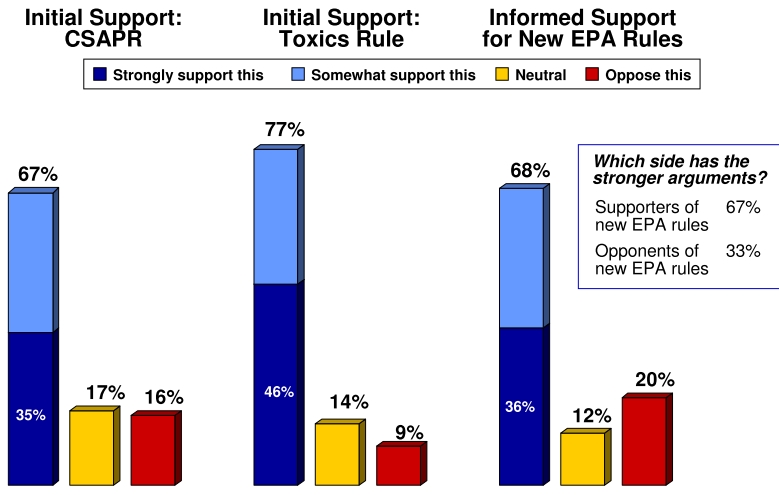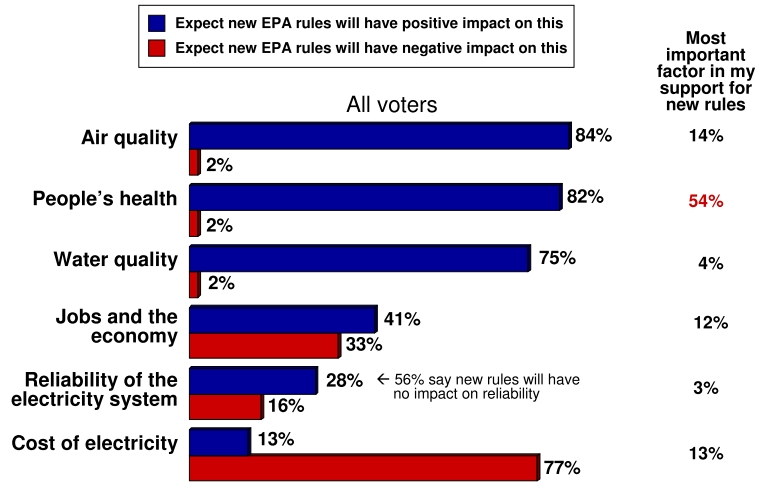The debate over upcoming EPA regulations is a perfect microcosm of contemporary U.S. politics, in all its unreality and venality. Two rules in particular are in the hot seat at the moment, both of which would crack down on pollution from power plants (yes, I’m about to serve up some alphabet soup, but it’ll be delicious): the Cross-State Air Pollution Rule (CSAPR), which would address smog and particulate pollution across state lines (also known as the Clean Air Transport Rule, or CATR), and Mercury and Air Toxics Standards (also known as utility MACT, for maximum achievable control technology), which would address, as one might expect, mercury and toxic emissions.
Two things have been fairly well established about these rules: Their benefits far exceed their costs and they are enduringly popular with the American people. Yet inside the Beltway bubble, it’s perfectly legitimate to argue that they would cripple the $14 trillion U.S. economy or, incredibly, that preventing them amounts to a jobs bill.
Nonetheless, the public gets it. The latest evidence comes from a nationwide poll conducted by Hart Research and GS Strategy Group, sponsored by Ceres. It found — like so many polls before it — that the public overwhelmingly supports clean air protections across demographic and party lines.
Some of the more striking results:
- Overall, voters favor air pollution protections by 60 percent to 22 percent (with 18 percent neutral). Specifically, they favor CSAPR by 67 to 16 and utility MACT 77 to 9.
- Here’s one that isn’t a surprise given Congress’ approval rating: Fully 75 percent of voters (even 62 percent of Republicans) think EPA, not Congress, should decide on air pollution rules.
- Fifty-four percent believe that public health should be the primary consideration in supporting new rules (just 13 percent think cost should matter most), and 82 percent believe that EPA rules will improve public health.
- Majorities are against delaying (67) or blocking (76) the rules.
- Republicans favor both rules too: CSAPR by 48 to 30 and utility MACT 63 to 20.
- Young voters (18-34, which I guess means I’m officially old) favor air protections by a whopping 77 percent.
- After being presented arguments from both sides, majority support for the rules remains robust — by 67 to 33 percent, voters think the rules’ supporters have better arguments.
Perhaps most interesting to me personally is the issue of how the public views the impact of these regulations on the cost of electricity. It is the one area where they believe EPA regs will have a negative impact:
The pollsters compared the impact of two common counter-arguments to price concerns. One focused on the public health benefits. The other addressed the concerns more directly by arguing that electricity prices in fact wouldn’t go up — they’d be held down by cheap natural gas, more than compensating for the cost of the rules. The latter argument was more compelling, particularly to Independents, who favored it by 20 percentage points. So maybe the conventional wisdom among the rules’ supporters that they should focus on public health is wrong, or at least incomplete. Perhaps it’s also wise to deal openly with the public’s main reservation: electricity prices.
Anyway, the fact that there’s a winnable political case to be made for EPA regulations won’t change the behavior of those in Congress who don’t want to make it. They tend to the interests of utilities and industries in their states. But EPA’s congressional defenders should take heart and so should the president. On a national level, this as popular as public policy gets.






